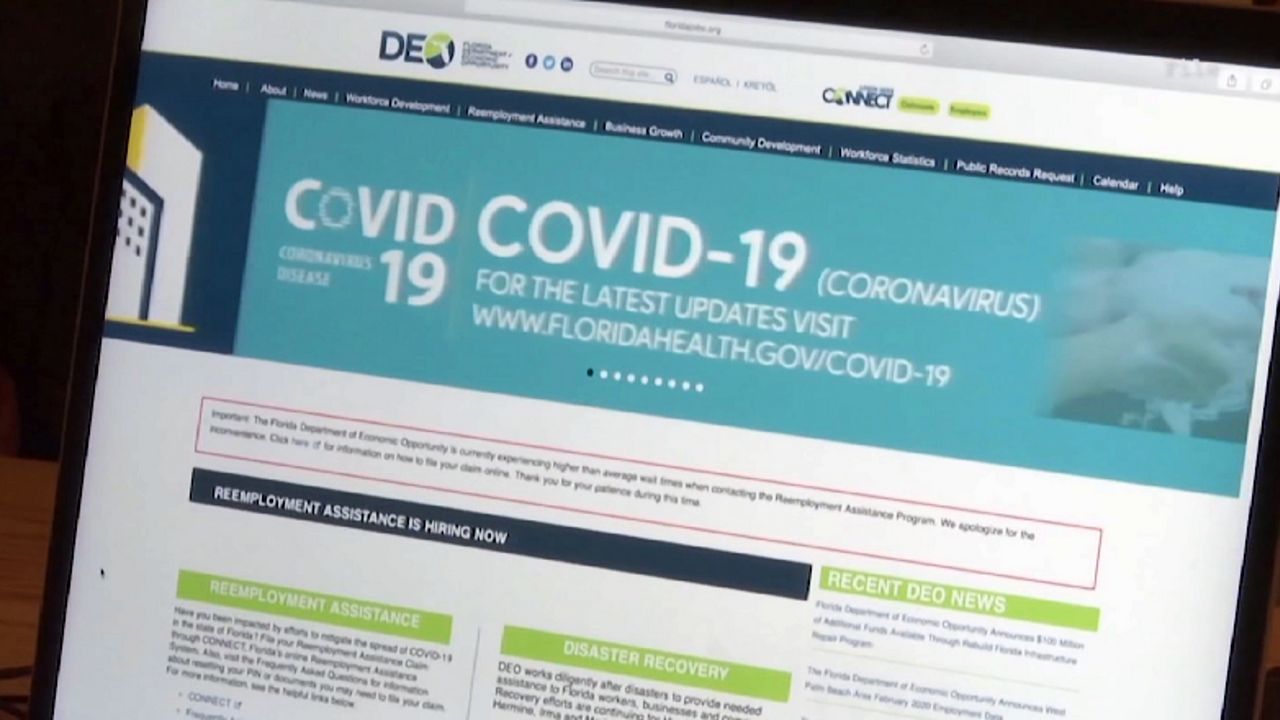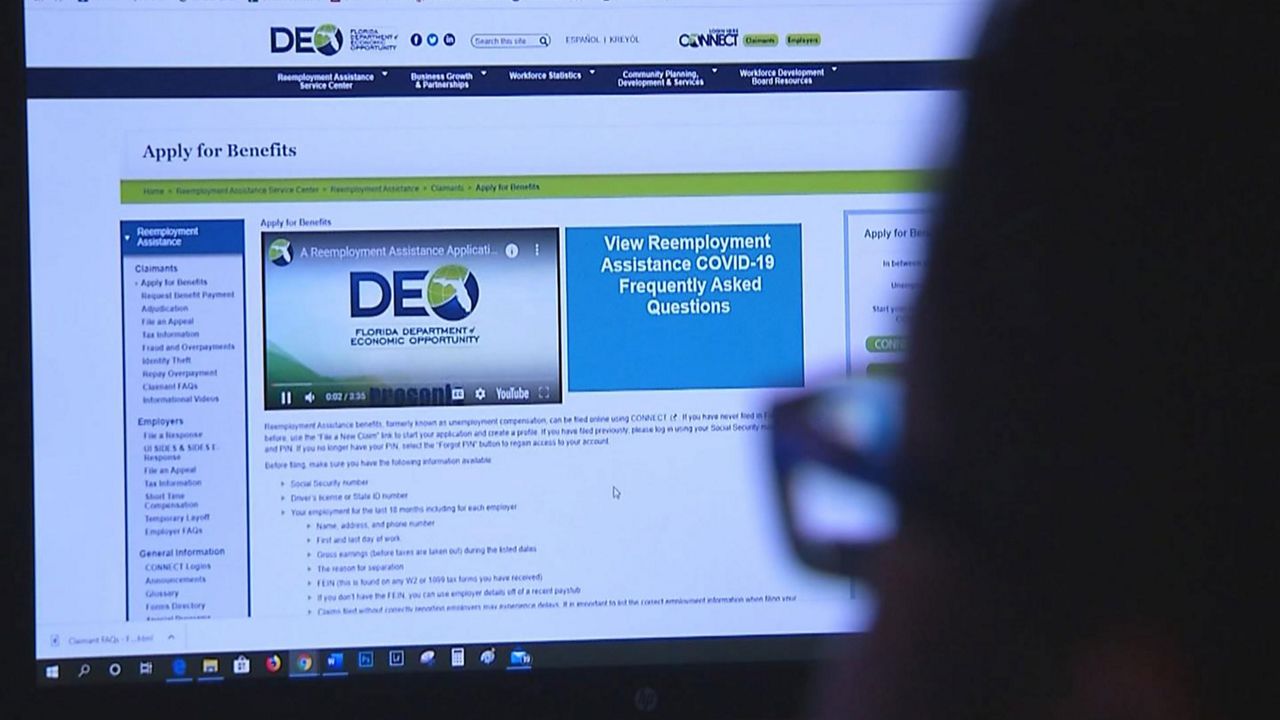TALLAHASSEE, Fla. — It's a deeply troubling statistic amid the largest wave of job losses since the Great Depression: just 14.2 percent of unemployment claims received by the Florida Department of Economic Opportunity are currently being paid.
- Jonathan Satter talks inheriting Florida's unemployment system
- Leaders point fingers at previous administrations for system's faults
- WATCH: Full Interview with Jonathan Satter ▼
- CORONAVIRUS LIVE UPDATES: Central Florida area | Tampa Bay area
- RELATED COVERAGE:
For Jonathan Satter, however, it represents significant progress during his five days on the job.
The secretary of the Department of Management Services, Satter was tapped by Gov. Ron DeSantis Thursday to take over the day-to-day management of DEO's unemployment compensation system.
The move has effectively relieved DEO Director Ken Lawson of much of his authority after Lawson — a holdover from the leadership team of former Gov. Rick Scott — was unable to give DeSantis basic information about the status of hundreds of thousands of claims.
By Monday, Satter had launched a dashboard providing that information. Just 6.2 percent of claims had been paid as of that evening; by Tuesday, the figure had risen by eight points.
Of 668,323 “confirmed unique claims,” 94,909 applicants had received benefit payments. Well over a half million applicants are still waiting, and that number is undoubtedly low because legions of jobless Floridians have been unable to successfully submit claims through DEO's problem-riddled CONNECT website.
In a one-on-one interview Tuesday, Satter said his goal is both simple and extremely complex.
"Mission critical is get those payments out as quickly as possible," he said, lamenting the condition of the system. "This is technology that's 10 years old. It's like a 10-year-old car. The 10-year-old car was built to drive 40 miles an hour with one passenger. We're now asking it to drive a Daytona 500, non-stop, at Daytona 500 speeds, for multiple weeks on end.
"Inheriting" a faulty system
Aides to DeSantis have expressed disdain about the shape of the unemployment system they inherited from the Scott administration.
In 2011, Scott oversaw a massive restructuring of the system, which included reducing the maximum weekly benefit to $275, cutting the maximum benefit period by more than half, changing the very name of the unemployment agency (it was previously the Agency for Workforce Innovation) and — critically — outsourcing the creation of the CONNECT site.
Not only have legions of Floridians just discovered how little state support they're eligible for, many have grappled to navigate a website they say is simply broken.
Issues with the website have been documented for years by the state's auditor general, but neither the Scott nor DeSantis administrations took tangible action to rectify them.
On Tuesday, Scott — now Florida's junior U.S. senator — deflected blame for the system's shortcomings to his predecessor, former Gov. Charlie Crist, now a Tampa Bay congressman.
"It was all started under the Crist administration, and you know the way the system works, it's a bid process, so all that happens is you get to, you have a system, that, the contractor that you're stuck with," Scott said in an interview with Spectrum News.
The Scott administration, however, oversaw the execution of the contract, which was held by Deloitte, a client of Scott inaugural co-chair Brian Ballard's lobby firm. As far back as 2013, then-DEO Director Jesse Panuccio was defending log-in faults with the website, telling a state House panel "the associated delay is not due to system error."
Crist advisor Kevin Cate said Tuesday that "Rick Scott broke (the system) on purpose" to reduce unemployment claims and associated employer taxes.
For Satter, fixing the system is now the order of the day. As website capacity expands with the purchase of dozens of additional servers and more new hires take their posts at DEO's unemployment hotline, he's working with the federal government to streamline what he says are unnecessary bottlenecks in the benefit application process.
Tuesday, he spoke with the assistant secretary of labor, requesting that Washington waive a requirement for applicants to file bi-weekly claims during the coronavirus pandemic. DeSantis has already waived that restriction on state benefits, but Satter says the federal restriction still stands.
He's also asking permission for the state to verify personal information, including social security numbers, through privately-administered databases. Federal databases have become bogged down with queries from unemployment systems in 49 other states, he said.
"I'm hopeful that through additional bureaucracy reduction and cutting that red tape and through the leadership of Gov. DeSantis, we'll be able to get folks on a regular schedule of being paid within the next two to three weeks," Satter predicted.
For applicants whose claims have been in stuck in limbo for a month or more, waiting two to three additional weeks isn't likely to come as good news. But at least now there's a clock, and a ticking one, at that.
"I don't want to set false expectations. Just understand that we are working as quickly as we can," Satter said.









